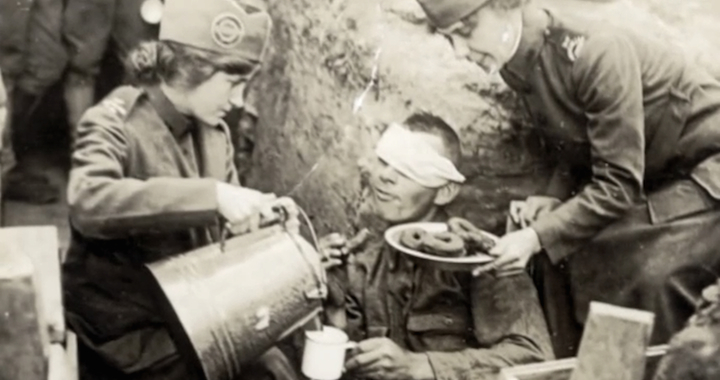Today, Monday July 28th 2014 marks the centennial of the start of World War I, or The Great War as it was called at the time. People thought it was the war to end all wars but they were wrong. One hundred years later, nation is still fighting against nation over the same issues that have caused wars for centuries…land, money, power, ethnicity, politics and religion. Everyone says they hate war but obviously not enough to do the hard work required to get along. Whenever we go to war we know we’re setting the stage once more for man to demonstrate the inhumanity towards man that we’re capable of, but that doesn’t seem to deter us. Perhaps partly because the government leaders who declare war aren’t doing any of the fighting. Mother Teresa once lovingly said, “If we have no peace, it is because we have forgotten that we belong to each other.” or as Blaise Pascal more pragmatically observed, “Can anything be stupider, than that a man has the right to kill me because he lives on the other side of a river and his ruler has a quarrel with mine, though I have not quarrelled with him?”.
Only a week after Austria-Hungary invaded Serbia to begin one of the bloodiest conflicts in human history, Britain and Canada declared war against Germany. The United States remained neutral until April 6th 1917 when it also declared war on Germany. The war came to an end at the eleventh hour of the eleventh day of the eleventh month of 1918.
Related: Syria. Why History Matters.
When the war began in 1914 there were 3.7 million men in Germany’s army but Britain only had an army of 700, 000. The legal age to enlist in England was eighteen (nineteen to fight overseas) but due to the pressure to bolster their forces as quickly as possible, military officials often turned a blind eye if they suspected potential recruits were too young to enlist, and the problem was exacerbated because recruitment officers were paid for each recruit. In hindsight we may find it hard to believe that anyone would enlist voluntarily, but there was a steady stream of teenagers ready to sign up. In many ways it was an age of innocence and young people became caught up in the naive idea that going to war would be like joining some college fraternity. Recruiting posters sold the war as a bunch of upright fellows going on an adventure to a foreign land to trounce The Hun in the name of king and country. They thought they’d be the hero, get the job done and be back home by Christmas but they had no idea of the unspeakable horrors that awaited them. It would be four gruelling years of trench warfare, barbed wire, poison gas and going over the top with bayonets fixed to attack an “enemy” on the other side of a barren no man’s land. Often Christian brother was pitted against Christian brother.
It’s estimated that 250, 000 boy soldiers fought in the British army. Boys like Abraham Bevistein, a young Polish-Jewish immigrant who was arrested for desertion. The following is a letter he wrote to his mother shortly after his arrest.
Dear Mother,
We were in the trenches and I was ill so I went out, and they took me to prison and I am in a bit of trouble now and won’t get any money for a long time. I will try my best to get out of it, so don’t worry. But, dear mother, try to send some money. From your loving son Aby.
He was found guilty and executed at sixteen years of age.
Conscription was introduced in England in 1916, so there was no further need for boy soldiers, and on April 6th 1917 the United States declared war on Germany.
But even in the darkest of times there is hope, and that hope came to American soldiers in 1918 when Helen Purviance, an ensign in the Salvation Army, was sent to France to work with the American First Division. Along with Ensign Margaret Sheldon she set up huts on the front line and began serving doughnuts and coffee to the troops. It was incredibly dangerous work and in the early days they had to use a wine bottle as a roller and a knife to cut the dough into strips that were then twisted into crullers. The women knelt in front of a potbellied stove because it was too backbreaking to lean over the low wood fire all day long to fry the doughnuts. Ensign Purviance is quoted as saying, “I was literally on my knees when those first doughnuts were fried, seven at a time in a small fry pan.” She added, “There was also a prayer in my heart that somehow this home touch would do more for those who ate the doughnuts than just satisfy a physical hunger.”
Also by Stephen: The Lion, the Witch, and the War
Their numbers grew to 250 women and they became known as Doughnut Girls (or Doughnut Lassies) and U.S. soldiers were given the nickname Doughnut Boys. The women made just 150 doughnuts that first day but were eventually able to produce 9, 000 per day, improvising with tools like condensed milk cans to form the doughnuts into circles and coffee pot lids to cut the holes. In addition to feeding the men on the front lines they also held church services, put on concerts and even mended clothes.
It’s said that God works in mysterious ways. Some see him in a beautiful sunset or a newborn baby, but I’m pretty sure that American soldiers in World War 1 France saw God in a doughnut and a coffee.

